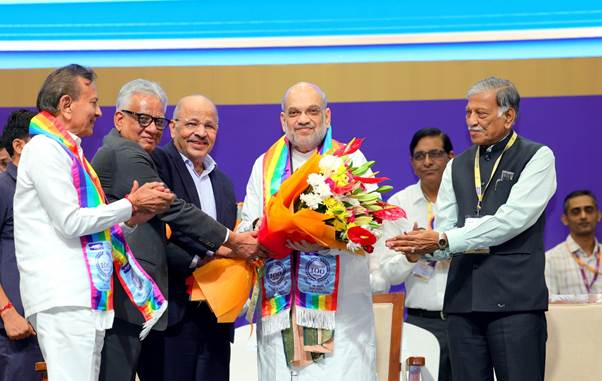Says all cooperative institutions should open their bank accounts in cooperative banks.
NEW DELHI: Union Home Minister and Minister of Cooperation, Amit Shah addressed the Centennial celebration (Swarnim Shatabdi Mahotsav) of the Ahmedabad District Cooperative (ADC) Bank as the chief guest. In his address, Amit Shah said that when an institution, despite many ups and downs, completes 100 years with honesty, it is not just a matter of pride for the institution but for the entire society. He emphasized that this becomes even more significant when the institution is a cooperative one, whose aim is to work not only for its interest, but for collective progress by uniting smaller sections of society.
Shah noted that the 100-year journey of Ahmedabad District Cooperative Bank, established in 1925, is a testament to the prosperity of farmers in Ahmedabad district. He said that the bank, which started as a small institution in Daskroi, has grown today to become one of the strongest district cooperative banks in the country, with a profit of Rs. 100 crore. Shah remarked that with nearly zero Non-Performing Assets (NPA), a profit of Rs. 100 crore, and deposits of around Rs. 6,500 crore, perhaps no one could have imagined at its inception that this small seed would grow into such a big tree, benefiting many.
He highlighted that ADC Bank has illuminated the lives of many societies, farmers, and livestock owners over the past hundred years. He noted that while various forms of agricultural assistance are easily available today, there was no such support system for farmers at the time of inception of ADC bank. At that time, farmers had no choice but to mortgage their land to moneylenders for loans. If a drought occurred and farmers were unable to repay their debts, they often lost their land and became farm laborers. Shah explained that it was Mahatma Gandhi who suggested to Sardar Vallabhbhai Patel the need to start the cooperative movement in Gujarat, following which many pioneers like Tribhuvandas Patel and Sardar Patel launched the cooperative movement. He expressed confidence that the cooperative sector, with its century-old history in India, will continue to contribute significantly in the coming century.
He said that while many successful economic models exist around the world in small countries with populations of 20-30 million, these models are not suitable for a large country like India with 1.3 billion people. He stressed that economic development alone is not sufficient for progress in a country like India. A successful economic model must also take into account the well-being, dignity, and happiness of its 1.3 billion citizens, something that can be found in the cooperative movement.


